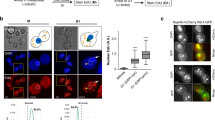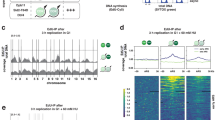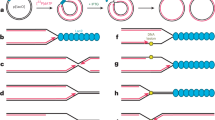Abstract
RADIOACTIVE precursors of DNA have widespread application in eukaryotic cell systems for studies of kinetic phenomena, such as DNA metabolism and cell population growth, and for labelling DNA1,2 for biophysical or biochemical investigations. Implicit in their use is the assumption that the experimental endpoints are not perturbed by the presence of the labelling isotope(s). But the validity of this assumption requires reevaluation in the light of reports that the incorporation of radioactive compounds into cellular DNA causes significant biological anomalies, including mutations, chromosome aberrations, cell death3, growth retardation and strand breaks in the DNA molecule4 (for reviews see refs 5 and 6). At least one investigator5 has advocated separate evaluation of the potential perturbations in every experimental system using radioisotope-labelled nucleic acid precursors.
This is a preview of subscription content, access via your institution
Access options
Subscribe to this journal
Receive 51 print issues and online access
$199.00 per year
only $3.90 per issue
Buy this article
- Purchase on Springer Link
- Instant access to full article PDF
Prices may be subject to local taxes which are calculated during checkout
Similar content being viewed by others
References
Feinendegen, L. E., Tritium-Labeled Molecules in Biology and Medicine (Academic, New York, 1967).
Cleaver, J. E., Thymidine Metabolism and Cell Kinetics (North-Holland, Amsterdam, 1967).
Bedford, J. S., Mitchell, J. B., Griggs, H. G., and Bender, M. A., Radiat. Res., 63, 531–543 (1975).
Cleaver, J. E., Thomas, G. H., and Burki, H. J., Science, 177, 996–998 (1972).
Wimber, D. E., Adv. radiat. Biol., 1, 85–115 (1964).
Setlow, R. B., and Setlow, J. K., A. Rev. Biophys. Bioengng, 1, 293–346 (1972).
Van Dilla, M. A., Trujillo, T. T., Mullaney, P. F., and Coulter, J. R., Science, 163, 1213–1214 (1969).
Kraemer, P. M., Deaven, L. L., Crissman, H. A., and Van Dilla, M. A., Adv. cell molec. Biol., 2, 47–108 (1972).
Simpson, J. R., Nagle, W. A., Bick, M. D., and Belli, J. A., Proc. natn. Acad. Sci. U.S.A., 70, 3660–3664 (1973).
Belli, J. A., and Shelton, M., Science, 165, 490–492 (1969).
Ehmann, U. K., thesis, Colorado State Univ. (1972).
Ehmann, U. K., Nagasawa, H., Petersen, D. F., and Lett, J. T., Radiat. Res., 60, 453–472 (1974).
Dean, P. N., and Jett, J. H., J. Cell Biol., 60, 523–527 (1974).
Lett, J. T., Klucis, E. S., and Sun, C., Biophys. J., 10, 277–292 (1970).
Lett, J. T., and Sun, C., Radiat. Res., 44, 771–787 (1970).
Author information
Authors and Affiliations
Rights and permissions
About this article
Cite this article
EHMANN, U., WILLIAMS, J., NAGLE, W. et al. Perturbations in cell cycle progression from radioactive DNA precursors. Nature 258, 633–636 (1975). https://doi.org/10.1038/258633a0
Received:
Accepted:
Published:
Issue Date:
DOI: https://doi.org/10.1038/258633a0
This article is cited by
-
Visualization of endothelial cell cycle dynamics in mouse using the Flt-1/eGFP-anillin system
Angiogenesis (2018)
-
Bromodeoxyuridine-immunohistochemistry on cellular differentiation and migration in the fundic gland of Xenopus laevis during development
Cell & Tissue Research (1992)
-
Discrimination of two fibroblast progenitor populations in early explant cultures of hamster gingiva
Cell and Tissue Research (1991)
-
DNA repair kinetics in irradiated undifferentiated and terminally differentiated cells
Radiation and Environmental Biophysics (1983)
-
A reappraisal of the stathmokinetic technique
Virchows Archiv B Cell Pathology Including Molecular Pathology (1983)
Comments
By submitting a comment you agree to abide by our Terms and Community Guidelines. If you find something abusive or that does not comply with our terms or guidelines please flag it as inappropriate.



